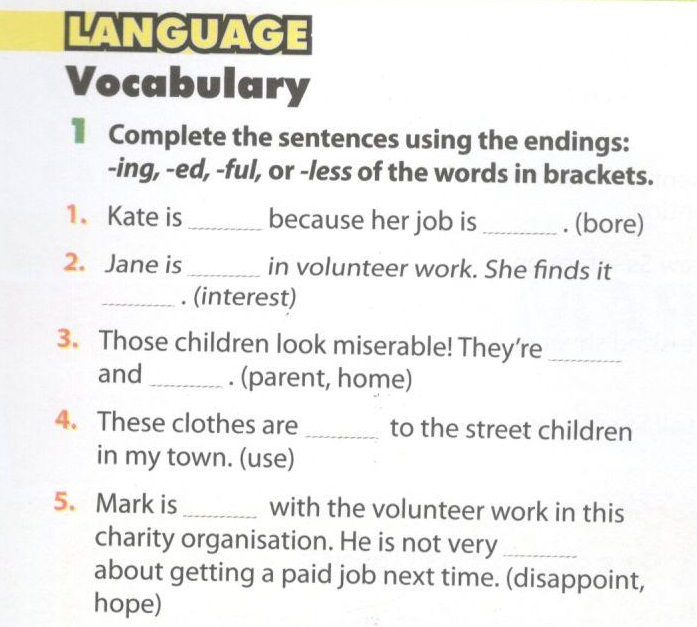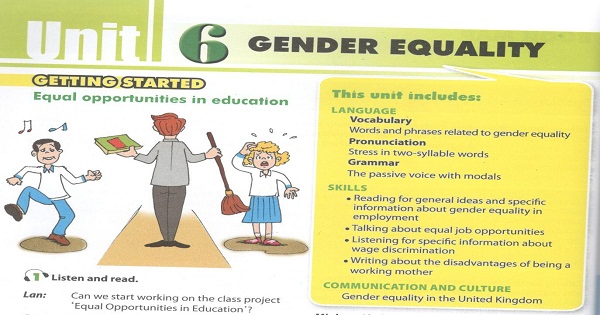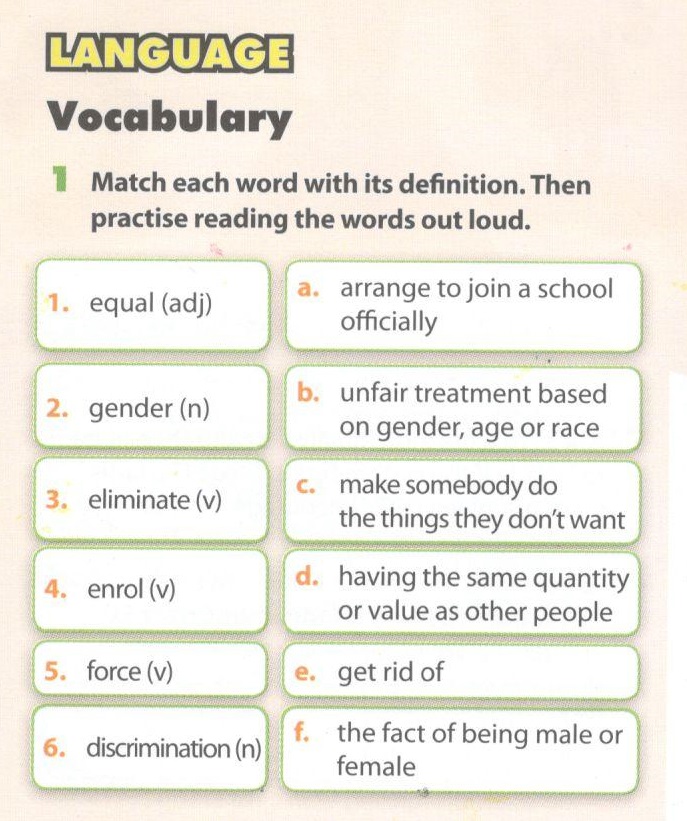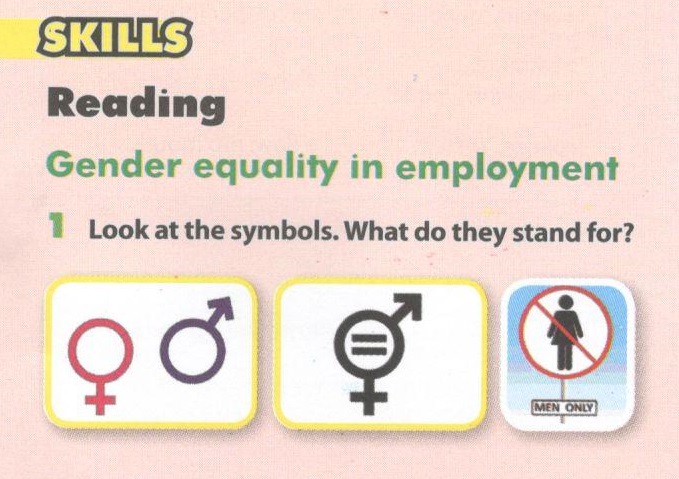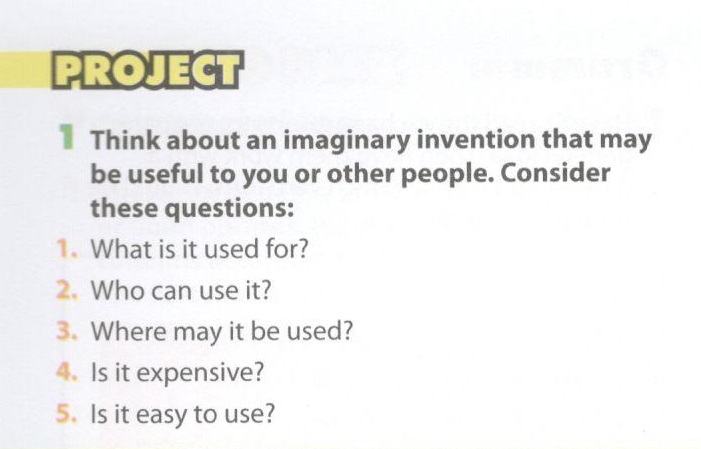
Language - trang 49 Unit 5 SGK Tiếng Anh 10 mới
Tổng hợp bài tập phần Language trang 49 Unit 5 SGK Tiếng Anh 10 mới.
- Bài học cùng chủ đề:
- Skills - trang 51 Unit 5 SGK Tiếng Anh 10 mới
- Communication and Culture - trang 55 Unit 5 SGK Tiếng Anh 10 mới
- Looking Back - trang 56 Unit 5 SGK Tiếng Anh 10 mới
- Ngữ pháp tiếng anh hay nhất
Vocabulary
1. a. Use a dictionary to find the meanings of the following compound nouns and their parts. Write them in the appropriate columns.
Dùng từ điển tra nghĩa của các danh từ nối và nghĩa từng phần của chúng. Viết vào cột phù hợp.

b. Discuss your findings with a partner. Is the meaning of each compound noun a combination of the meanings of its parts?
Thảo luận kết quả bạn tìm được với bạn bè. Nghĩa của mỗi danh từ nối có phải là tổ hợp nghĩa của từng phần không?
KEY
a.
1. video game: a game in which players control and move images on a screen (video: film or image; game: something you play for fun)
2. smartphone: a mobile phone that has some functions of a computer (smart: intelligent, computer-controlled; phone: a telephone)
3. laptop: a portable, small computer that can work with a battery (lap: top part of your leg; top: upper surface)
4. e-book: a book that is displayed on a computer screen or an electronic device (electronic: using microchips to control a small electric current; book: a written work)
5. email: a way of sending messages to other people by using a computer (electronic: using microchips to control a small electric current; mail: post, letters)
b.
No, not always (e.g. laptop)
2. Below are parts of some other compound words. Match the first parts of the words with the second ones.
Dưới đây là những phần trong từ nối. Nối phần đầu với phần cuối của từ.

KEY
1. d pencil case (túi đựng bút)
2. e blackboard (bảng đen)
3. a washing machine (máy giặt)
4. c headphones (tai nghe)
5. b food processor (máy nghiền thức ăn)
Pronunciation
1. Listen and repeat these words or phrases. Pay attention to their stressed syllables.
Lắng nghe và lặp lại các từ hoặc cụm từ. Chú ý đến âm tiết được nhấn mạnh.
Click tại đây để nghe:

2. Listen and tick (v) the words you hear.
Click tại đây để nghe:

KEY
1. b
2. a
3. a
4. b
5. a
AUDIO SCRIPT
1. GREEN house
2. SOFTware
3. gold BRICK
4. MOVING van
5. tall BOY

Grammar
Gerunds and infinitives
1. Complete the definitions or uses of the inventions using the correct forms of the verbs given (V-ing or to-infinitive).
Hoàn thành các định nghĩa hoặc cách dùng của các phát minh bằng cách sử dụng dạng đúng của động từ được cho (động từ-ing hoặc to-động từ)
1. A laptop or a smartphone can be used for (get) ___________ access to the Internet or (send) ___________ messages.
2. You can use social networking sites (create) ___________ your personal profile and (contact) ___________ other people.
3. When you're tired of carrying lots of books or novels when you travel, an e-book reader may help - it is used (read) ______________ electronic books, newspapers or magazines.
4. If you want to relax without using a smartphone with a small screen or a bulky laptop, you can use a handheld video game device (play) ______________ computer games.
5. A food processor is used for (chop) ______________ up or (mix) ______________ food.
6. We can use a USB stick (store)_____________ a lot of music or video files.
KEY
1. getting; sending (be used for doing something: được dùng để làm gì)
2. to create; (to) contact (use something to do something: dùng gì để làm gì)
3. to read (be used to do something: được sử dụng để làm gì)
4. to play (use something to do something: dùng gì để làm gì)
5. chopping; mixing (be used for doing something: được dùng để làm gì)
6. to store (use something to do something: dùng gì để làm gì)
2. Think of an item in your classroom or house. Describe it to a partner, using a gerund or an infinitive. See if your partner can guess what it is.
Nghĩ về một món đồ trong lớp hoặc trong nhà bạn. Mô tả nó với người bạn, sử dụng cụm động danh từ hoăc động từ nguyên mẫu. Thử xem người bạn của bạn đoán nó là gì.
Example:
Student A: This is used for making clothes clean.
Student B: Is it a washing machine?
Student A: That's right.
The present perfect
1. Label the timelines below with the words from the box.
Dán nhãn những mốc thời gian dưới đây với từ trong ô.

KEY

past: sự việc đã diễn ra và chấm dứt trong quá khứ.
present perfect: sự việc đã diễn ra trong quá khứ và kéo dài đến hiện tại hoặc để lại kết quả ở hiện tại. Hoặc thì hiện tại hoàn thành được chia cho các hành động diễn ra sau hành động trong quá khứ.
future: sự việc diễn ra trong tương lai.
2. Match the beginnings in A with the ends in B. Put the verbs within brackets in the present simple or the present perfect.
Nối phần đầu ở cột A với phần cuối ở cột B. Đặt động từ trong ngoặc ở thì hiện tại đơn hoặc thì hiện tại hoàn thành.

KEY
1. b has broken (Vì Kim đã bị gãy tay, nên cô ấy không thể chơi cầu lông. - Việc gãy tay xảy ra trong quá khứ nhưng kết quả của nó còn để lại đến hiện tại => Thì hiện tại hoàn thành.)
2. d looks; has lost / lost (Trông anh ta không vui bởi vì anh ta vừa làm mất tiền. - Hiện tại trông anh ta không vui => thì hiện tại đơn. Việc anh ta làm mất tiền trong quá khứ để lại hậu quả đến hiện tại => thì hiện tại hoàn thành.)
3. e Do you know; have forgotten / forget (Bạn có biết người phụ nữ đó không? Tôi biết, nhưng tôi quên tên rồi. - Biết là nhận thức ở hiện tại => thì hiện tại đơn. Hành động quên ở hiện tại cũng đã quên, có thể bắt nguồn việc quên từ quá khứ => thì hiện tại đơn hay hiện tại hoàn thành đều được.)
4. a have asked (Tôi đã nhờ giáo viên giúp đỡ. Tôi cũng vậy. - Hành động nhờ giúp đỡ đã xảy ra trong quá khứ, có kết quả ở hiện tại => thì hiện tại hoàn thành.)
5. c left; have disappeared (Anh ấy đi mà quên khóa hộc bàn, nên những món đồ giá trị đã bị mất. Anh ấy quên trong quá khứ => thì quá khứ đơn. Những món đồ bị mất diễn ra sau đó, để lại hậu quả đến hiện tại => thì hiện tại hoàn thành.)
3. The following paragraph is about the importance of computers. Choose the correct verb tense.
Đoạn văn sau là về tầm quan trọng của máy tính. Chọn thì đúng cho động từ.
Life without computers (1) seems / has seemed simply impossible now. Computers (2) affected / have affected every aspect of our lives. Since the time they (3) were / have been invented, computers (4) encouraged / have encouraged great technological progress in different fields. Along with computers, the Internet (5) aids / has aided the developments in technology. However, many people argue that computers (6) killed / have killed physical contact between people. For example, teenagers now (7) prefer / have preferred chatting on the computer to meeting face to face. Do you agree?
KEY
1. seems (có 'now', đang nói về hiện tại => thì hiện tại đơn)
2. have affected (hành động ảnh hưởng bắt đầu từ quá khứ, kéo dài đến bây giờ => thì hiện tại hoàn thành)
3. were (hành động phát minh xảy ra hoàn toàn trong quá khứ => thì quá khứ đơn)
4. have encouraged (hành động hỗ trợ bắt đầu từ quá khứ, kéo dài đến bây giờ => thì hiện tại hoàn thành)
5. has aided (hành động hỗ trợ bắt đầu từ quá khứ, kéo dài đến bây giờ => thì hiện tại hoàn thành)
6. have killed (hành động kéo dài từ trước đến nay => thì hiện tại hoàn thành)
7. prefer (có 'now', đang nói về hiện tại => thì hiện tại đơn)
dayhoctot.com
- Unit 1: family life
- Unit 2: your body and you
- Unit 3: music
- Review 1: units 1-2-3
- Unit 4: for a better community
- Unit 5: inventions
- Review 2: unit 4-5
- Unit 6: gender equality
- Unit 7: cultural diversity
- Unit 8: new ways to learn
- Review 3: unit 6-7-8
- Unit 9: preserving the environment
- Unit 10: ecotourism
- Review 4: unit 9-10
- Tổng hợp từ vựng lớp 10 (vocabulary) - tất cả các unit sgk tiếng anh 10 thí điểm
